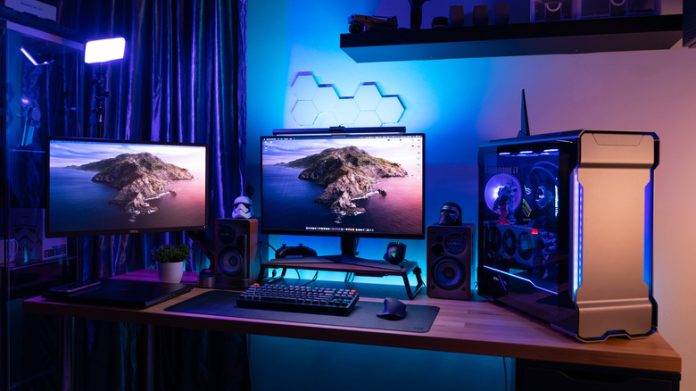Building your own gaming PC under $500 offers better value for money and empowers you to create a system that meets your gaming needs while staying within your budget. While it may seem daunting at first, the process of assembling a gaming PC allows you to optimize performance, customize components, and save money compared to purchasing a pre-built system.
When building a gaming PC under a limited budget, every dollar counts. By carefully selecting individual components and taking advantage of cost savings, you can maximize the performance of your system while keeping costs in check. Building your own PC also provides the opportunity for customization, allowing you to prioritize the components that matter most to you, such as the CPU and GPU.
Unlike pre-built systems, which often come with additional costs for labor and brand premiums, building your own gaming PC allows you to allocate your budget more efficiently. This means you can invest more in crucial components that directly impact gaming performance, rather than paying for unnecessary features or brand names.
Cost Savings
When building your own gaming PC under $500, one of the significant advantages is the potential for cost savings. By carefully selecting and sourcing individual components, you can optimize your budget and get the most value for your money. Here are some ways you can save costs when building a gaming PC under $500:
- Component Selection:
- Compare prices: Research and compare prices of different components from various retailers to find the best deals.
- Prioritize critical components: Allocate a larger portion of your budget to crucial components like the CPU and GPU, which have the most significant impact on gaming performance.
- Consider previous generation components: Look for previous generation CPUs and GPUs that offer excellent performance at a lower cost, as they often see price reductions when newer models are released.
- Avoid unnecessary features:
- Identify your specific needs: Focus on components that cater to your gaming requirements and avoid unnecessary features or overkill specifications that may drive up the cost.
- Skip extras: Opt out of unnecessary accessories or components that don’t significantly contribute to gaming performance, such as RGB lighting or premium aesthetics.
- Consider refurbished or used components:
- Explore refurbished options: Consider purchasing refurbished components from reputable sellers, as they can offer significant savings without compromising quality.
- Buy used components: Buying used components from trusted sources can provide substantial cost savings, but ensure that they are in good condition and have not been overclocked excessively.
- Take advantage of sales and discounts:
- Keep an eye on seasonal sales and promotions: Retailers often offer discounts during holidays or special events, allowing you to save on your component purchases.
- Sign up for newsletters and monitor price-tracking websites: Stay informed about price drops and special offers on components, ensuring you can make your purchases when prices are at their lowest.
By employing these cost-saving strategies, you can build a capable gaming PC under $500 without compromising on performance or quality. Remember to strike a balance between price and performance, focusing on components that offer the best value for your budget. In the next section, we will discuss the benefits of customization and performance optimization when building a gaming PC under $500.
Customization and Performance Optimization
One of the significant advantages of building your own gaming PC under $500 is the ability to customize and optimize the system’s performance according to your specific gaming needs. By carefully selecting and configuring components, you can achieve a setup that maximizes gaming performance within your budget. Here’s how customization and performance optimization come into play:
- Tailored Component Selection:
- CPU selection: Choose a CPU that strikes the right balance between performance and price. Consider factors like core count, clock speed, and compatibility with other components.
- GPU selection: Prioritize the graphics card, as it plays a crucial role in gaming performance. Look for a GPU that provides the best performance within your budget and matches the requirements of the games you intend to play.
- RAM and storage: Optimize the amount and speed of RAM based on your gaming and multitasking needs. Choose storage options that offer a balance between capacity and performance, such as SSDs for faster load times.
- Overclocking Potential:
- Explore overclocking: If you’re comfortable with it, overclocking can be a way to boost performance without spending extra money. Select components that allow for overclocking and ensure proper cooling and stability while doing so.
- Research safe overclocking settings: Take time to learn about safe overclocking practices and follow reliable guides to maximize performance while avoiding potential risks.
- Efficient Cooling Solutions:
- Consider cooling options: Proper cooling is essential to ensure optimal performance and component longevity. Research and select cooling solutions such as air coolers or all-in-one liquid coolers that fit within your budget and provide efficient heat dissipation.
- Ensure proper airflow: Plan the layout of your components and case fans to ensure adequate airflow within the system, minimizing heat buildup and improving overall performance.
- Software Optimization:
- Update drivers and firmware: Regularly update drivers and firmware for your components to benefit from performance optimizations and bug fixes released by manufacturers.
- Optimize in-game settings: Adjust graphics settings in games to find a balance between visual quality and performance. Lowering demanding settings can improve frame rates and overall gameplay experience.
By customizing and optimizing your gaming PC’s components, overclocking capabilities, cooling solutions, and software settings, you can achieve a system that delivers excellent gaming performance within your budget. This tailored approach ensures that you are getting the most out of each component and maximizing your gaming experience.
In the next section, we will explore the importance of component selection when building a gaming PC under $500 and provide recommendations for essential components within the budget.
Component Selection
When building a gaming PC under $500, selecting the right components is crucial to achieving optimal performance and value for your budget. Here are some key components to consider:
- CPU (Central Processing Unit):
- Look for a CPU that offers a good balance between price and performance, such as an AMD Ryzen processor like the Ryzen 3 3300X or Ryzen 5 3600.
- Consider factors like core count, clock speed, and compatibility with other components to ensure smooth gaming performance.
- GPU (Graphics Processing Unit):
- Prioritize the GPU as it heavily impacts gaming performance. Look for options like the NVIDIA GeForce GTX 1650 Super or AMD Radeon RX 5500 XT, which offer good performance in the budget range.
- Consider factors like VRAM capacity, clock speed, and power requirements to match your gaming needs.
- RAM (Random Access Memory):
- Aim for at least 8GB of DDR4 RAM, which is the minimum requirement for most modern games. Consider 16GB if your budget allows for better multitasking performance.
- Look for RAM modules with higher clock speeds to improve overall system performance.
- Storage:
- Consider a combination of SSD (Solid State Drive) and HDD (Hard Disk Drive) storage options.
- Use an SSD for the operating system and frequently played games to benefit from faster load times, while utilizing an HDD for mass storage of files and less frequently accessed games.
- Motherboard:
- Choose a motherboard that is compatible with your chosen CPU and offers the necessary features for your gaming needs.
- Look for motherboards with sufficient expansion slots, support for high-speed RAM, and necessary connectivity options like USB and Ethernet ports.
- Power Supply: 1. Invest in a reliable power supply unit (PSU) with sufficient wattage to accommodate your components and potential future upgrades. 2. Look for a PSU with an 80 Plus efficiency rating for energy efficiency and stable power delivery.
- Case:
- Select a case that fits your chosen components and provides adequate airflow for cooling.
- Consider features like cable management, dust filters, and additional fans for optimal system cooling and maintenance.
Research and compare prices from different retailers to find the best deals on these components. Prioritize the components that have the most significant impact on gaming performance, such as the CPU and GPU, while ensuring compatibility with other parts.
In the next section, we will discuss the benefits of building your own gaming PC under $500 in terms of future upgrades and flexibility.
Learning Experience and Skill Development
Building your own gaming PC under $500 not only offers a cost-effective solution but also provides a valuable learning experience and skill development opportunity. Here are the benefits of gaining knowledge about computer hardware through the process:
- Understanding Computer Hardware:
- By building your own gaming PC, you gain hands-on experience with different components and their functionalities, such as CPUs, GPUs, RAM, and storage devices.
- You develop a deeper understanding of how these components interact and contribute to overall system performance.
- Troubleshooting and Problem-Solving:
- During the building process, you may encounter challenges and issues that require troubleshooting.
- This presents an opportunity to develop problem-solving skills, learning to identify and resolve hardware-related problems effectively.
- Customization and Personalization:
- Building your own PC allows for customization and personalization according to your preferences and needs.
- You can choose components that align with your gaming requirements and aesthetic preferences, gaining a sense of ownership over your system.
- Upgrading and Repairs:
- Acquiring knowledge about computer hardware empowers you to perform future upgrades and repairs on your own.
- You can easily replace or upgrade components as needed, saving money on professional services and extending the lifespan of your system.
- Keeping Up with Technology:
- Technology advances rapidly, and building your own PC keeps you engaged and up to date with the latest trends.
- You can stay informed about new hardware releases, performance improvements, and industry advancements, making informed decisions for future upgrades.
- Transferable Skills:
- The skills acquired during the process of building a gaming PC extend beyond the realm of computer hardware.
- You develop skills such as attention to detail, organization, research, and critical thinking, which are applicable in various aspects of life and other technical pursuits.
By taking on the challenge of building your own gaming PC, you not only save money but also gain knowledge, skills, and confidence in dealing with computer hardware. This empowers you to maintain, upgrade, and customize your system according to your evolving needs, providing a rewarding and educational experience.
In the next section, we will explore the flexibility and future upgradeability that building your own gaming PC under $500 offers, allowing you to adapt to changing technology and gaming demands.
Conclusion
In conclusion, building your own gaming PC under $500 offers several advantages. It provides better value for money by optimizing costs and prioritizing performance. The customization options allow you to tailor your system to your specific gaming preferences. The learning experience and skill development gained through building and troubleshooting your PC are invaluable. Additionally, the flexibility for future upgrades ensures that your gaming PC can evolve with changing technology and gaming demands.
So, take the plunge and embark on the journey of building your own gaming PC. Not only will you save money, but you’ll also gain knowledge, satisfaction, and a personalized gaming experience that will enhance your gaming adventures for years to come.





